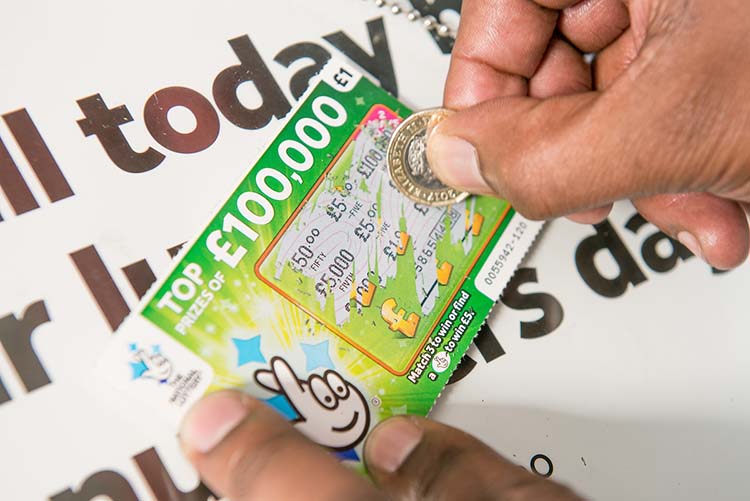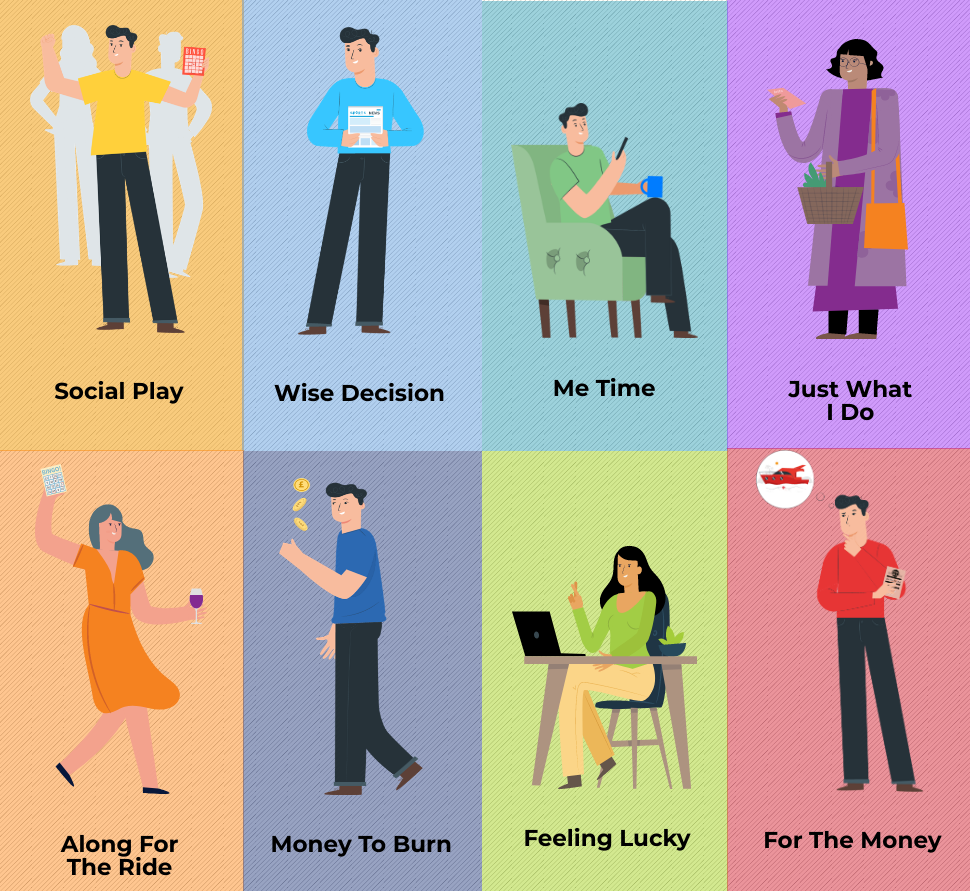
What motivates people to gamble?
We wanted to learn more about what motivates people to gamble and how gambling fits into their lives.
Posted 25 May 2021 by Communications
As part of a new way of understanding consumers, we wanted to discover more about the motivations behind why people gamble to help us learn how gambling fits into people’s lives.
In November 2018 we commissioned research agency, 2CV, to conduct a two-phase research project to help us get under the skin of the choices people make when they gamble and understand more about gambling behaviour.
The research is not part of our official statistics release schedule. Instead, the project is intended to be informative and spark conversation about how future developments in the gambling industry can deliver fairer and safer gambling.
Find out more about our approach to statistics and research.
The research aims to:
- add to the Commission’s wider evidence base and educate colleagues
- develop our understanding of different types of consumers and allow us to communicate better with these different types of audiences
- review any policy or operational implications that may arise from the findings
- inform and input into the direction of future research projects.
The first phase of research used a variety of qualitative techniques including digital diaries, immersive in-depth interviews and focus groups with over 100 participants. A key output from this research was the identification of eight different consumer ‘typologies’, describing a variety of motivations to gamble on different occasions.
We published the outcome of this first phase of research in 2019 with a blog about how gambling fits into people's lives.
The second, quantitative phase of research was conducted with a larger, nationally representative sample of around 1,700 gamblers. This further insight has allowed us to validate and refine the typologies drawn from the initial findings.
This blog will explore these eight typologies in detail.
How can we use the typologies?
We can use the typologies as a foundation to argue that gambling behaviour and motivations are complex. Operators therefore need to think about consumers in a more complete way, and tailor their customer interactions accordingly.
Rather than focusing on demographic characteristics or different sectors of gambling, typologies allow us to focus on the triggers that are at play when individuals choose to gamble.
For example, Gambler A might be aged 18, male and mainly a slot machine player. The research allows us to understand what typology this player may fall into for different situations and gambling activities.
The typologies also help us to identify and understand gamblers’ motivations, enjoyment factor, and belief in the win. This helps to create a more in-depth understanding of gambling customers.
It is important to note that these typologies describe triggers or motivations to gamble, rather than people. A single gambling session can involve a range of fleeting drivers as the gambling experience changes.
The eight gambling typologies

Social Play
"Gambling is something my friends and I love doing together, whether it’s having a friendly competition, adding more excitement to an event, or just for a bit of fun."
Characteristics of the Social Play typology:
- it is something they enjoy doing with friends or family
- they are competing against friends or family
- they enjoy the game or the gamble itself.
Motivations of the Social Play typology:
- to be social and to feel part of something
- to have fun.
Triggers of the Social Play typology:
- someone recommended they play.
People whose gambling falls into Social Play are more likely to play:
- bingo in person
- sports betting on races
- arcades.
People whose gambling falls into Social Play are most likely to be:
- youngest of all the typologies (under 45 and particularly under 25).
Wise Decision
"Gambling is a matter of skill and I’m confident in my ability to get it right, which is why I enjoy turning events into another opportunity to test my skills."
Characteristics of the Wise Decision typology:
- confident they will win
- the gamble requires some skill.
Motivations of the Wise Decision typology:
- to add excitement to a game or experience.
Triggers of the Wise Decision typology:
- because the game or odds had changed
- because there was a special game.
People whose gambling falls into Wise Decision are more likely to play:
- sports betting on games
- sports betting on races.
People whose gambling falls into Wise Decision are most likely to be:
- males aged under 45
- those who have a high income
- from a Black or ethnic minority background.
Me Time
"I love to play and indulge in a little ‘me’ time, with the added reward of knowing I will probably come out lucky."
Characteristics of the Me Time typology:
- they gamble as an opportunity for some ‘me’ time
- they were feeling lucky.
Motivations of the Me Time typology:
- to pass the time.
Triggers of the Me Time typology:
- they had some money left in their online account.
People whose gambling falls into Me Time are more likely to play:
- online slot machine games
- fruit and slot machines
- online casino games.
People whose gambling falls into Me Time are most likely to be:
- slightly younger (under 45 years old).
Just What I Do
"Gambling is just something I’ve been doing for a while, and I enjoy it as a little treat regardless of whether I win or not."
Characteristics of the Just What I Do typology:
- they always do it
- it is a solo activity
- they enjoy taking part even if they lose.
Motivations of the Just What I Do typology:
- it’s just a part of their routine
- as a treat.
Triggers of the Just What I Do typology:
- they gamble regularly.
People whose gambling falls into Just What I Do are more likely to play:
- lottery
- scratchcards
- instant Win Games.
People whose gambling falls into Just What I Do are most likely to:
- have a slightly lower income (under £20,000 per year) and be over 55 years old.
Along for the Ride
"Gambling isn’t something I’m particularly interested in, it’s just a way I get to enjoy being with others, even if it means I will possibly end up out of pocket!"
Characteristics of the Along for the Ride typology:
- they take part with friends or family
- they have no idea if they will win anything.
Motivations of the Along for the Ride typology:
- to be social.
Triggers of the Along for the Ride typology:
- someone recommended they play
People whose gambling falls into Along for the Ride are more likely to play:
- lottery
- scratch cards
- bingo
- arcades.
People whose gambling falls into Along for the Ride are most likely to be:
- females under 35.
Money to Burn
"I’m just using up some leftover credit on a bit of a whim – I have nothing to lose!"
Characteristics of the Money to Burn typology:
- they play with ‘free’ money
- they feel they have nothing to lose
- hey take part on a whim.
Motivations of the Money to Burn typology:
- it is a spontaneous decision.
Triggers of the Money to Burn typology:
- they are offered free spins, bets, account top ups
- they had loose change in their pocket.
People whose gambling falls into Money to Burn are more likely to play:
- scratchcards
- instant win games
- online bingo.
People whose gambling falls into Money to Burn are most likely to:
- have a slightly lower income (under £20,000 per year).
Feeling Lucky
"Sometimes those lucky chances come my way and I can’t help but take a gamble, especially if it gives me an opportunity to prove myself."
Characteristics of the Feeling Lucky typology:
- the ‘stars aligned’ for them to win
- it is a way to prove their skill with friends or family.
Motivations of the Feeling Lucky typology:
- they felt lucky.
Triggers of the Feeling Lucky typology:
- they had heard of someone winning
- they had just been paid
- it caught their eye, for example, they saw it at a till.
People whose gambling falls into Feeling Lucky are more likely to play:
- all gambling activities
- slight bias towards fruit and slot machines.
People whose gambling falls into Feeling Lucky are most likely to be:
- earning a high income (£70,000+ a year)
- from a Black or ethnic minority background
- aged under 35.
For the Money
"I don’t put much thought into gambling, I just like the idea of winning big, even if it is a long shot."
Characteristics of the For the Money typology:
- they aren’t very involved in the activity itself
- winning is a long shot, and the result is all down to chance.
Motivations of the For the Money typology:
- to win large amounts of money.
Triggers of the For the Money typology:
- there is a big prize pot or a rollover jackpot available.
People whose gambling falls into For the Money are more likely to play:
- lotteries.
People whose gambling falls into For the Money are most likely to be:
- a non-problem gambler, over the age of 55 years old.
Understanding the relationships between typologies
The research revealed a wide range of relationships between typologies and the gambling occasions that people were involved in. All primary typologies that people’s gambling fell into shared at least some strong parallels with one or more other typologies.
For example, those who engaged in a gambling activity for some Me Time also reported engaging in another gambling activity because ‘It’s Just What I Do’. This sheds additional light on people’s habits and helps us to understand an individual’s gambling play in that moment in greater detail.
A better understanding of gambling motivations
It is clear that the industry needs to move away from looking at consumers in a one-dimensional way and to a more rounded view of the individual. For example, Person A may be male, aged 18 who mainly plays slots. This person could also fall into the ‘Wise Decision’ typology and may display riskier behaviour when placing bets on sporting events.
Through a better understanding of individual gambling motivations and triggers, operators could begin to better identify when ‘normal’ behaviour shifts into more ‘risky’ behaviour and step in accordingly.
While additional exploration is needed to fully appreciate the implications of these initial findings, this research highlights a case for operators to adopt a similar approach to consumer breakdown by furthering their work around ‘Knowing Your Customer’.
